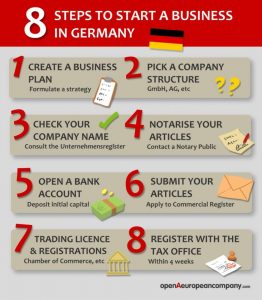As a location to start a new e-commerce business, Germany has a lot to offer. Online shopping is a well-established habit of many Germans, and reaching these keen shoppers will be an attractive proposition for any retailer.
As an economic powerhouse in the heart of Europe, Germany represents a great opportunity for new enterprises. Another location to consider for your e-commerce business is in the USA. When opening a business anywhere, of course, there are things to contemplate – so let’s take a look at a few of the considerations.
The German e-commerce market
According to World Bank figures from 2016, nearly 9 out of 10 Germans are Internet users (89%, compared to the UK’s 92% and the USA’s 76%). Not only that, but 87% of the population is reportedly in the habit of shopping online, where they predominantly purchase clothing, shoes, books and electronics.
Germany’s e-commerce environment is populated with some formidable local retail giants – and although the international behemoth Amazon tops the list of most-used platforms, almost all of the country’s other favoured websites are German companies. Ranked by 2017 revenue, the top performers are:
- Amazon.de (€8.82billion – international company)
- Otto.de (€2.96billion – based in Hamburg)
- Zalando.de (€1.28billion – based in Berlin)
- Notebooksbilliger.de (€751.5million – based in Sarstedt)
- Mediamarkt.de (€734.2million – based in Ingolstadt)
Further down a list that continues to be dominated by local retailers, Apple’s German store clocks in at number 14, with Swedish furniture giant Ikea a few places behind. The message seems clear – Germans overwhelmingly prefer to buy from retailers that have a local presence.
Clicks and bricks
For the vast majority of German online shoppers, trust is a key issue – many will be reluctant to buy from an unknown and unproven foreign entity, and several businesses have found that having a physical presence in the country is essential to making their store seem authentic to customers. In other words, you may need “bricks” before you can get serious “clicks.”
Securing a localised Top Level Domain (TLD) for your website is strongly recommended for implying German residency to your customers from the get-go. A physical local address is required in order to obtain a .de domain, although it is possible to find domain registrars prepared to act as proxies if you don’t have an actual base on German soil.
There are also other area TLDs that are more exact still, such as .berlin, .hamburg and so on, although invoking a location that’s very specific in a URL might be detrimental to the reach of an online retailer (and again, you would need a physical address in these locations in order to qualify for the registration).
Returns and invoices
It’s well known that Germany has a high rate of returns for online goods, with some items such as clothing being returned to the seller 70% of the time! In fact, Germany has the highest overall e-commerce return rate of any EU country, at 41%. This may be another reason to maintain a physical base in the country – Germans expect free postage on returns by default, and if the majority of your sales are going to come back to you in a different country you could find yourself receiving a lot of international postage fees you hadn’t anticipated.
Part of the reason for the high return rate can be accounted for by the German preference for paying for their goods via settling an invoice as much as a month after the initial purchase. Especially when ordering clothing and shoes, this arrangement allows German consumers to shop with confidence and only pay for garments that fit the way they’d hoped.
It may be tempting to eschew this payment method and only offer the more retailer-friendly credit/debit card and PayPal options, but beware: 29% of German consumers consider open invoicing to be their favourite method of payment and likely wouldn’t shop anywhere that didn’t offer it.
Perhaps surprisingly, only 17% of German online shoppers prefer to pay with a credit or debit card, with most favouring PayPal or the aforementioned invoicing method. There are also local payment methods favoured by many customers, such as SOFORT banking and Giropay, and it may be a good idea to try to support these methods if possible.
Speaking the language
Even though 56% of Germans understand English, you should still make translation and localisation into German a priority for your online business, for two reasons. Firstly, just because a German shopper can shop in English doesn’t mean that they want to, or are comfortable that way – and secondly, there may be trust issues with buying from an unknown website that is not presented in full German, and which is clearly foreign. A predominantly English-language e-commerce site will probably struggle against an otherwise equal competitor displayed in German, so don’t skimp on translation.
If you don’t happen to speak German yourself, translation may turn out to be a more complicated issue than you might think. Consider, for example, that a simple word-for-word translation of your online store may not be enough to compete with the very carefully worded, cannily targeted efforts of your competitors – and also most of your business registration documents will need to be filed in German. Investing in high-quality professional help, then, could be essential to your success.
Localisation, too, is important to consider – not just translating the text on your website, but also acknowledging local customs and holidays. Less obviously, you may also find that there are different public holidays observed in the northern and southern regions of Germany and differences from state to state.
VAT registration and online regulations
The standard VAT rate in Germany is 19%, and any e-retailer will need to be VAT registered to comply with German law. If you’re considering shipping products to Germany from another EU country, however, the good news is there is a €100,000 sales threshold below which VAT doesn’t apply. The process of starting a new company in Germany is somewhat complicated, but help is always available.
Also important to get right for an online retailer are privacy policies, GDPR and cookie law compliance and payment security – and getting these in order will go a long way toward building trust with consumers.
In summary, although it can be competitive and demanding, the German market is a great opportunity for e-commerce retailers. By spending the time to build trust with local consumers and do business in the way that makes them the most comfortable, online merchants can position themselves for massive success in a country of eager e-shoppers.







